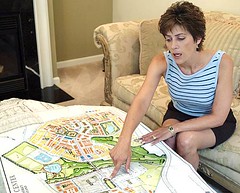The Cost of Civic Engagement
 Amy Presley of Clarksburg Town Center points to differences between the plan residents were shown by developers and what is being built. Residents say they are not getting the neotraditional design they were promised. (Baltimore Sun photo by David Hobby)
Amy Presley of Clarksburg Town Center points to differences between the plan residents were shown by developers and what is being built. Residents say they are not getting the neotraditional design they were promised. (Baltimore Sun photo by David Hobby)The Post editorializes, in "The Cost of a Fight," about the debacle in the Clarksburg area of Montgomery County, where neighbors banded together to provide more solid oversight than the County Planning Department, and they found many problems. The citizen group has asked for the County to reimburse them for the $500,000+ that they have spent.
The Post doesn't like this at all, writing:
"It's also hard to imagine a worse precedent than having taxpayers pay off a citizens group that petitions local government to redress its grievances. It's one thing to fight city hall, but it's another to expect that city hall will finance the fight -- including lawyers, lunch, copying bills and cell phone calls along the way. Quite aside from the incentive it would offer to pursue frivolous causes, who would determine which groups and causes were worthy of taxpayer-funded reimbursements and which were not?"
OTOH, why should citizens be expected to shell out this kind of money to ensure that government officials as well as developers follow the laws?
This brings me to raise once again something I have mentioned off and on for a couple years.
People are probably familiar with how utility rates are monitored and set. Most states have a public utilities commission and a process for setting rates. There is an "Office of the People's Counsel" that represents utility users (the citizen-residents) in this process.
Citizens are vastly underrepresented when it comes to many matters that come before government. I have said for some time that the "Office of the People's Counsel" process for utility rate monitoring needs to be adapted for zoning and other matters.
In DC, I think that there should be Offices of the People's Counsel created to provide counsel, technical support, and perhaps even representation, for matters before the Zoning Commission, the Board of Zoning Adjustment, and the Alcoholic Beverage Control Board.
Index Keywords: civic-engagement



0 Comments:
Post a Comment
<< Home